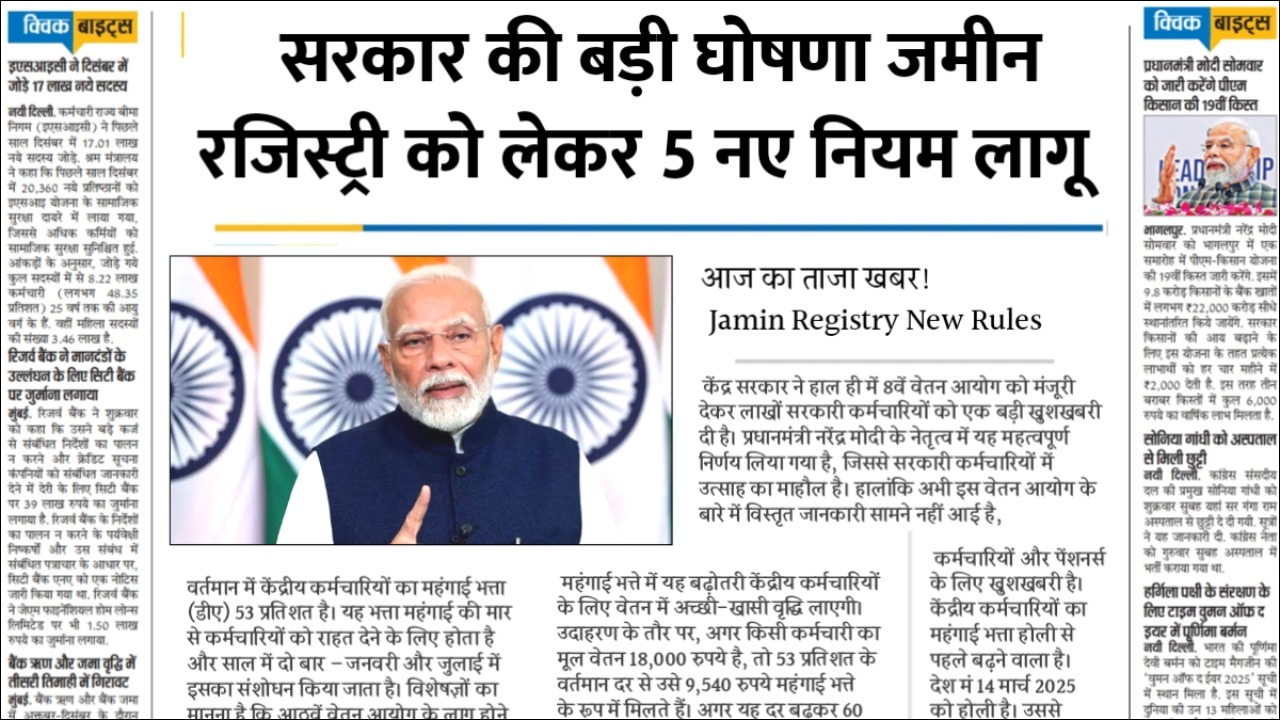In 2025, the Government of India introduced new Land Registry Rules aimed at making property registration faster, transparent, and fully digital. This reform modernizes how land and property ownership records are maintained, reducing fraud and streamlining the buying and selling process. The initiative supports the Digital India vision by ensuring that land data is secure, accessible, and tamper-proof.
Overview
| Particular | Details |
|---|---|
| Scheme Name | New Land Registry Rule 2025 |
| Implemented By | Ministry of Rural Development & Department of Land Resources |
| Objective | Digital transformation and transparency in land registration |
| Effective Year | 2025 |
| Coverage | All Indian states and union territories |
| Technology Used | Blockchain-based digital land records, e-Registration, and GIS mapping |
| Beneficiaries | Property buyers, landowners, farmers, and real estate investors |
Purpose of the Rule
The 2025 Land Registry reform seeks to eliminate property fraud, improve ownership verification, and make record management seamless. Its main purposes are:
- To create tamper-proof and transparent land ownership records.
- To promote paperless, corruption-free registration through online systems.
- To reduce land disputes by integrating unique property identification numbers (UPIN).
- To align local and national land data under One Nation, One Land Record.
Key Features of the New Land Registry Rule 2025
- Digital Registration: All property transactions must be registered online using the government e-Registry portal.
- Blockchain Integration: Land records will be stored on a blockchain network to prevent duplication or forgery.
- Property ID System: Each land parcel will have a Unique Property ID (UPIN) linked to Aadhaar and GPS coordinates.
- E-KYC Verification: Buyers and sellers must complete biometric and Aadhaar-based e-KYC before registration.
- Stamp Duty Payments Online: Digital payment gateways will handle stamp duty and registration charges.
- Integration with Banks: Financial institutions can verify land records instantly before approving property loans.
- Real-time Record Update: Once registered, ownership data updates instantly across central and state systems.
- Mobile App Access: A new government app will allow citizens to check land ownership and registry status.
Eligibility Criteria
To register property under the new rules:
- The applicant must be an Indian citizen or an entity recognized under Indian law.
- The property must be free from encumbrances (no pending disputes).
- Aadhaar verification is mandatory for both buyer and seller.
- Digital documents (sale deed, NOC, PAN, etc.) must be uploaded in approved formats.
Registration Process
- Log in to the State Land Registration Portal (available on official state government websites).
- Create a Digital Property Account using Aadhaar and mobile number.
- Enter Property Details — location, survey number, area, and ownership details.
- Upload Required Documents — sale deed, proof of ownership, ID proof, and tax receipts.
- Pay Fees Online — stamp duty and registration fee through government payment gateway.
- E-Verification — biometric verification via Aadhaar and OTP.
- Digital Certificate Issued — an e-Registered title deed and Unique Property ID (UPIN) are issued instantly.
Benefits of the New Rule
- Faster Registration: The process now takes hours instead of days.
- Reduced Corruption: Elimination of middlemen and manual data handling.
- Transparency: Public access to verified ownership data through secure platforms.
- Fraud Prevention: Blockchain technology ensures records cannot be altered.
- Ease of Access: Land records can be viewed online from anywhere.
Implementation Status by States (2025)
| State | Implementation Status | Key Feature Introduced |
|---|---|---|
| Maharashtra | Fully implemented | Blockchain land record pilot completed |
| Karnataka | In progress | Property ID integration |
| Uttar Pradesh | Partially implemented | Online registry and e-KYC |
| Tamil Nadu | Pilot testing | GIS-based mapping system |
| Gujarat | Fully implemented | Paperless property transfer enabled |
Why It Matters
Land-related disputes account for nearly 65% of all civil cases in India. By digitizing and securing ownership records, the new rule aims to protect citizens’ property rights, boost investor confidence, and support transparent governance. It also brings India closer to achieving a Digital Land Ecosystem where citizens can own, transfer, and verify land records effortlessly.
Final Takeaway
The New Land Registry Rule 2025 marks a major shift toward digital governance and transparency in India’s real estate sector. With blockchain integration and Aadhaar-based verification, property transactions will now be faster, fairer, and safer. Citizens are encouraged to register their properties digitally and verify all ownership details on the official portal to enjoy full legal protection.
FAQs
Q1. When does the new Land Registry Rule 2025 come into effect?
It has been implemented in phases across India starting from April 2025.
Q2. Can I register land without visiting the office?
Yes, property registration can now be done fully online through e-Registry portals.
Q3. What is the Unique Property ID (UPIN)?
UPIN is a digital identification number assigned to every land parcel for easy verification and fraud prevention.

